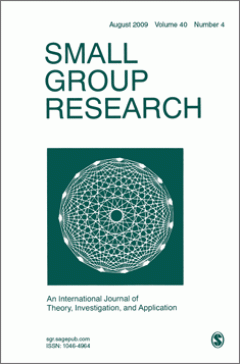Filter by

Verbal Interaction Sequences and Group Mood : Exploring the Role of Team Plan…
Employing the framework of emotional contagion, this study investigated the link between group interaction sequences (specifically complaining and interest-in-change messages) and group mood. Fifty-two work group discussions from two German industrial enterprises were coded with the act4teams category system (e.g., Lehmann-Willenbrock & Kauffeld). Lag sequential analysis revealed complaining as…
- Edition
- Vol. 42 no. 6, December 2011.pp. 639-668
- ISBN/ISSN
- 10464964
- Collation
- -
- Series Title
- Small Group Research
- Call Number
- -

When Critical Knowledge Is Most Critical : Centralization in Knowledge-Intens…
Knowledge-intensive teams rely on the task-relevant knowledge held by members to perform effectively. In this article, we focus on critical knowledge, defined as the most influential information, know-how, or feedback that contributes directly to task outcomes. From a social network perspective, the critical knowledge structure in a team can be defined by who shares critical knowledge with whom…
- Edition
- Vol. 42 no. 6, December 2011.pp. 669-699
- ISBN/ISSN
- 10464964
- Collation
- -
- Series Title
- Small Group Research
- Call Number
- -

The Effects of Physical Threat on Team Processes During Complex Task Performance
Teams have become the norm for operating in dangerous and complex situations. To investigate how physical threat affects team performance, 27 three-person teams engaged in a complex planning and problem-solving task, either under physical threat or under normal conditions. Threat consisted of the possibility that during task performance the oxygen level would be reduced (which, in reality, did …
- Edition
- Vol. 42 no. 6, December 2011.pp. 700-729
- ISBN/ISSN
- 10464964
- Collation
- -
- Series Title
- Small Group Research
- Call Number
- -

The Multilevel Effects of Network Embeddedness on Interpersonal Citizenship B…
Interpersonal citizenship behavior (ICB) in organizations is an inherently relational and multilevel phenomenon. Using a multilevel framework, this study investigates the different levels of social network antecedents of ICBs. Specifically, the authors examine the effects of individual-level network characteristics (centrality and transitivity) and group-level network properties (density and ce…
- Edition
- Vol. 42 no. 6, December 2011.pp. 730-760
- ISBN/ISSN
- 10464964
- Collation
- -
- Series Title
- Small Group Research
- Call Number
- -

THE FUTURE OF NETWORK GOVERNANCE RESEARCH : STRENGTH IN DIVERSITY AND SYNTHESIS
he popularity and scope of network governance research and practice continues to expand from its divergent foundations, assumptions and methodological positions. This paper introduces a symposium of papers on this substantial sub-field by first summarizing the sprawling research endeavour that comprises it. The main theoretical and empirical approaches that have been used to guide it to date ar…
- Edition
- Volume 89, Issue 4, December 2011, pages 1221–1234
- ISBN/ISSN
- 00333298
- Collation
- -
- Series Title
- Public Administration
- Call Number
- -

PUBLIC PRIVATE PARTNERSHIPS : ADDED VALUE BY ORGANIZATIONAL FORM OR MANAGEMENT?
The central idea of public private partnerships (PPPs) is that added value can be achieved from greater co-operation between public and private actors. In general, the literature speaks of PPPs in which public and private actors develop a more or less sustainable co-operation through which they realize products, services, or policies together, share risks, and develop an organizational form to …
- Edition
- Volume 89, Issue 4, December 2011, pages 1235–1252
- ISBN/ISSN
- 00333298
- Collation
- -
- Series Title
- Public Administration
- Call Number
- -

DEMOCRATIC SUBJECTIVITIES IN NETWORK GOVERNANCE : A Q METHODOLOGY STUDY OF EN…
Network forms of governance enable public managers to exercise considerable agency in shaping the institutions through which government interacts with citizens, civil society organizations and business. These network institutions configure democratic legitimacy and accountability in various ways, but little is known about how managers-as-designers think about democracy. This Q methodology study…
- Edition
- Volume 89, Issue 4, December 2011, pages 1253–1273
- ISBN/ISSN
- 00333298
- Collation
- -
- Series Title
- Public Administration
- Call Number
- -

HOW POLITICIANS AND BUREAUCRATS NETWORK : A COMPARISON ACROSS GOVERNMENTS
Effective public administration relies on the passage of information through interpersonal communication networks. While we have a vast research literature concerning formal structures and roles in organizations, including public agencies and government institutions, we know far less about the flow of information through semiformal, voluntary interactions. In this paper we use a large survey to…
- Edition
- Volume 89, Issue 4, December 2011, pages 1274–1292
- ISBN/ISSN
- 00333298
- Collation
- -
- Series Title
- Public Administration
- Call Number
- -

NETWORK GOVERNANCE AND ENVIRONMENTAL MANAGEMENT : CONFLICT AND COOPERATION
In this article we propose structural preconditions for effective network governance, including network structures that can facilitate effective coordination of action (such as relational and structural embeddedness), and agreement among network actors about goals and actions. We illustrate circumstances in which these preconditions do not seem to be met through a case study of environmental go…
- Edition
- Volume 89, Issue 4, December 2011, pages 1293–1313
- ISBN/ISSN
- 00333298
- Collation
- -
- Series Title
- Public Administration
- Call Number
- -

FACTORS INFLUENCING THE USE OF PERFORMANCE INFORMATION FOR DECISION MAKING IN…
Is the state of a performance measurement system the most important element for promoting the utilization of performance indicators (PIs) in the public sector? Or are there other more influential factors, such as organizational culture, or even individual perceptions on the merit of performance measurement for their agency? Through a survey on a small group of managers specializing in performan…
- Edition
- Volume 89, Issue 4, December 2011, pages 1316–1334
- ISBN/ISSN
- 00333298
- Collation
- -
- Series Title
- Public Administration
- Call Number
- -

INNOVATION, PUBLIC POLICY AND PUBLIC SERVICES DELIVERY IN THE UK. THE WORD TH…
This paper explores the dialogue about innovation in public services currently found within public policy and creates an interaction between research and practice about its strengths and limitations. It argues that this dialogue is a flawed one, often both at odds with the existing evidence and lacking a holistic understanding of the nature of innovation and its distinctive policy and manageria…
- Edition
- Volume 89, Issue 4, December 2011, pages 1335–1350
- ISBN/ISSN
- 00333298
- Collation
- -
- Series Title
- Public Administration
- Call Number
- -

PARALLEL STRUCTURES IN THE EGYPTIAN GOVERNMENT BUREAUCRACY : A PROBLEMATIC QU…
This paper investigates the proliferation of parallel structures � also known as project implementation units (PIUs) and technical offices (TOs) � within the Egyptian public administration system and the pressures since the 1990s that have led to their increasing numbers, including the current political turmoil. To determine whether these structures are a viable tool for the implementation of r…
- Edition
- Volume 89, Issue 4, December 2011, pages 1351–1366
- ISBN/ISSN
- 00333298
- Collation
- -
- Series Title
- Public Administration
- Call Number
- -

APPRAISING PUBLIC VALUE : PAST, PRESENT AND FUTURES
Despite the increasing popularity of the concept of �public value� within both academic and practice settings, there has to date been no formal review of the literature on its provenance, empirical basis, and application. This paper seeks to fill this gap. It provides a critical introduction to public value and its conceptual development before presenting the main elements of the published lite…
- Edition
- Volume 89, Issue 4, December 2011, pages 1367–1384
- ISBN/ISSN
- 00333298
- Collation
- -
- Series Title
- Public Administration
- Call Number
- -

PUBLIC–NONPROFIT PARTNERSHIP PERFORMANCE IN A DISASTER CONTEXT : THE CASE O…
- Edition
- Volume 89, Issue 4, December 2011, pages 1385–1402
- ISBN/ISSN
- 00333298
- Collation
- -
- Series Title
- Public Administration
- Call Number
- -
- Edition
- Volume 89, Issue 4, December 2011, pages 1385–1402
- ISBN/ISSN
- 00333298
- Collation
- -
- Series Title
- Public Administration
- Call Number
- -

VOICE AND CHOICE IN HEALTH CARE IN ENGLAND : UNDERSTANDING CITIZEN RESPONSES …
Using data from a five-year online survey the paper examines the effects of relative satisfaction with health services on individuals' voice-and-choice activity in the English public health care system. Voice is considered in three parts � individual voice (complaints), collective voice voting and participation (collective action). Exercising choice is seen in terms of complete exit (not using …
- Edition
- Volume 89, Issue 4, December 2011, pages 1403–1418
- ISBN/ISSN
- 00333298
- Collation
- -
- Series Title
- Public Administration
- Call Number
- -

MANAGING CITIZENS' EXPECTATIONS OF PUBLIC SERVICE PERFORMANCE : EVIDENCE FROM…
Citizens' expectations of public service performance influence their attitudes and behaviour towards services, including satisfaction, choice of service and political voice about them. However, there has been little research on what sets expectations. This paper assesses the effects of prior service performance and information about prior performance on two forms of citizen expectations, positi…
- Edition
- Volume 89, Issue 4, December 2011, pages 1419–1435
- ISBN/ISSN
- 00333298
- Collation
- -
- Series Title
- Public Administration
- Call Number
- -

THE ORDER OF QUESTIONS IN A SURVEY ON CITIZEN SATISFACTION WITH PUBLIC SERVIC…
Surveys of citizen satisfaction with local public services have become widespread, with the results increasingly used to reorganize services, to allocate budgets, and to hold managers accountable. But evidence from a split-ballot experiment that we conducted suggests that the order of questions in a citizen survey has important effects on reported satisfaction with specific public services as w…
- Edition
- Volume 89, Issue 4, December 2011, pages 1436–1450
- ISBN/ISSN
- 00333298
- Collation
- -
- Series Title
- Public Administration
- Call Number
- -

ONE-STOP SHOPS FOR SOCIAL WELFARE : THE ADAPTATION OF AN ORGANIZATIONAL FORM …
In recent years welfare services in Western Europe have been criticized for poor coordination. In response, �seamlessness� has emerged as a vision for public administration with �one-stop shops' viewed as means to reach this. This article conceptualizes the one-stop shop and presents a three country case study to examine its drivers and its adaptation. In all countries the reforms meant mergers…
- Edition
- Volume 89, Issue 4, December 2011, pages 1451–1468
- ISBN/ISSN
- 00333298
- Collation
- -
- Series Title
- Public Administration
- Call Number
- -

STRATEGIC LINKS IN A CUT-THROAT WORLD : RETHINKING THE ROLE AND RELATIONSHIPS…
Ministerial staff relationships form part of the networks within the core executive. This article uses data from a comprehensive empirical study of Australian ministerial staff to explore advisers' horizontal relationships with each other. It finds that the interactions between Australian ministerial advisers are a key part of their role, are highly valued by ministers and public servants, and …
- Edition
- Volume 89, Issue 4, December 2011, pages 1469–1488
- ISBN/ISSN
- 00333298
- Collation
- -
- Series Title
- Public Administration
- Call Number
- -

ISSUE FRAMING AND SECTOR CHARACTER AS CRITICAL PARAMETERS FOR GOVERNMENT CONT…
This article shows that variations in how two UK governments justified contracting-out (issue framing), combined with shifting sector-derived incentives for union activism (sector character), can help explain the extent of contracting-out. Janitorial service, an activity of the UK government that should have been �low hanging fruit' for its prolific reformers, proved difficult to contract-out f…
- Edition
- Volume 89, Issue 4, December 2011, pages 1489–1508
- ISBN/ISSN
- 00333298
- Collation
- -
- Series Title
- Public Administration
- Call Number
- -
 Computer Science, Information & General Works
Computer Science, Information & General Works  Philosophy & Psychology
Philosophy & Psychology  Religion
Religion  Social Sciences
Social Sciences  Language
Language  Pure Science
Pure Science  Applied Sciences
Applied Sciences  Art & Recreation
Art & Recreation  Literature
Literature  History & Geography
History & Geography